Fairview: Will Gompertz reviews the Pulitzer Prize-winning play at London's Young Vic ★★★★☆
- Published
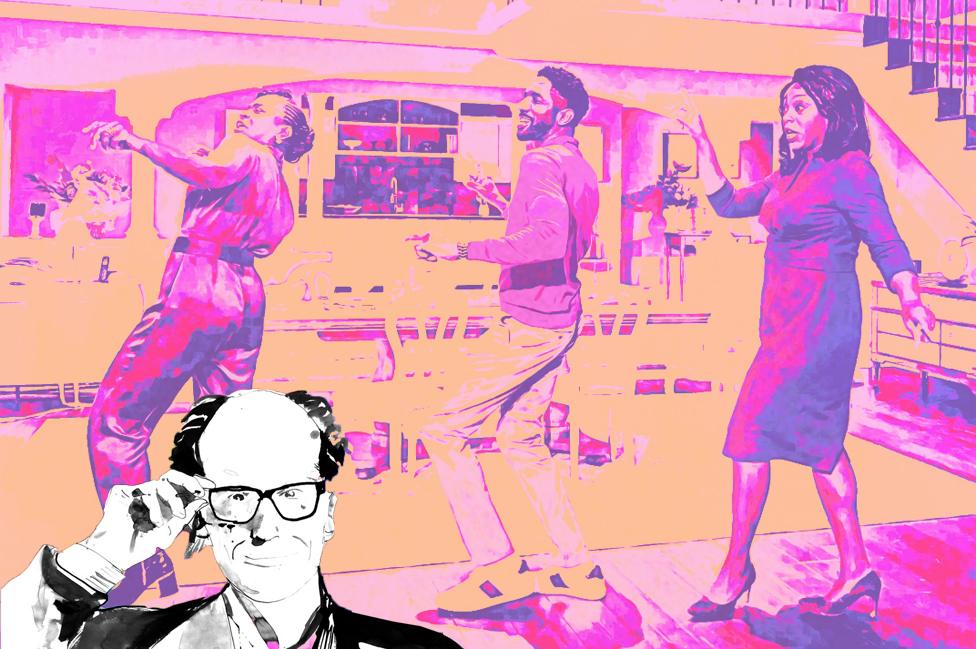
A friend was mulling over whether or not to buy a ticket to see Jackie Sibblies Drury's Pulitzer Prize-winning play Fairview at the Young Vic in London (its sell-out run had been extended). She asked me what I thought of the play. I said it was impactful. She said, so is a punch in the face.
I paused.
Maybe impactful was the wrong word.
It's certainly an awkward, ugly, uncomfortable word. Maybe, then, it was exactly the right word for a play that sets itself up as a comedy, but is actually a powerful polemic about race.
Was the play fun? Not really.
Was it entertaining? In parts, but it was also annoying and confusing: absurd, even.
Was it impactful? Yes, it was. In fact, it lands some blows so hefty and memorable that there were moments when it did feel like being punched in the face.
I, for one, came away feeling dazed and confused.
Did I like the play? Did I hate it? Did it work? Or, was it a near-miss? These are questions to which I still do not have answers.
What I am sure about, though, is Fairview is an important, provocative, mind-altering work of art, the like of which I have never seen in the theatre before.
It starts out conventionally enough.
We are in the bourgeois home of a black, middle-class American family. Beverly (Nicola Hughes) is peeling carrots for a celebratory birthday meal for her elderly mother, who is resting upstairs. There is music playing. Beverly is singing along while her husband, Dayton (Rhashan Stone), pops in and out, doing his bit here and there.

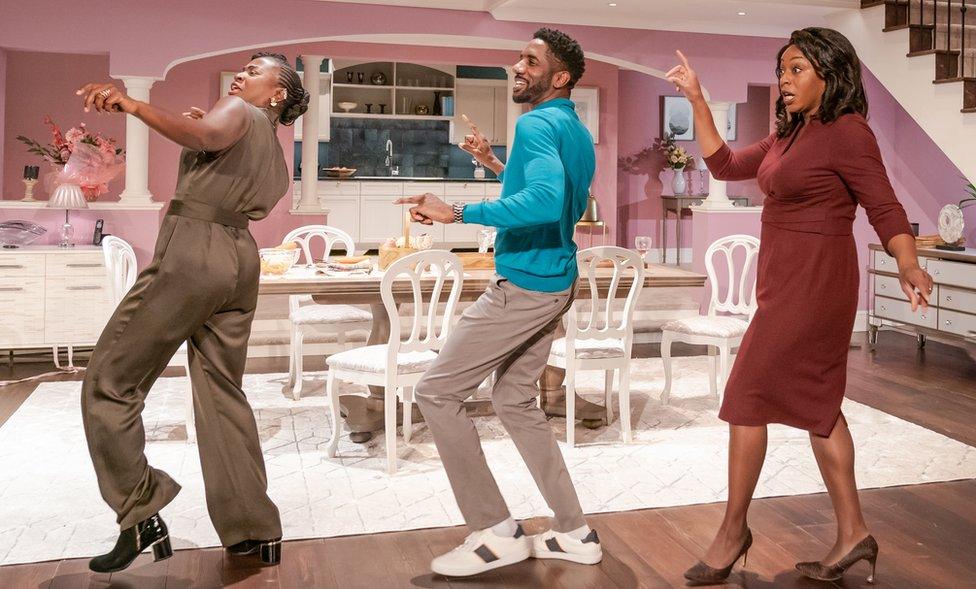
Left to right: Jasmine (Naana Agyei-Ampadu) with her brother-in-law Dayton (Rhashan Stone) and sister Beverly (Nicola Hughes) in a happier moment

Enter Jasmine (Naana Agyei-Ampadu), Beverly's opinionated sister, who immediately turns an atmosphere that was already simmering with tension, up a notch or two.
Dayton can't be a good lover, she tells her sister high-handedly; it's obvious from the awkward way he "walk around like his balls all heavy."
Dayton's response is to offer Jasmine a nibble from the cheese tray, a gracious act at which she turns up her nose, and announces grandly that she no longer eats dairy.
Into this family gathering arrives Keisha (Donna Banya), Beverly and Dayton's gifted teenage daughter, who is doing very well at school but wants to take a gap year before going to college, which is against her mother's wishes.
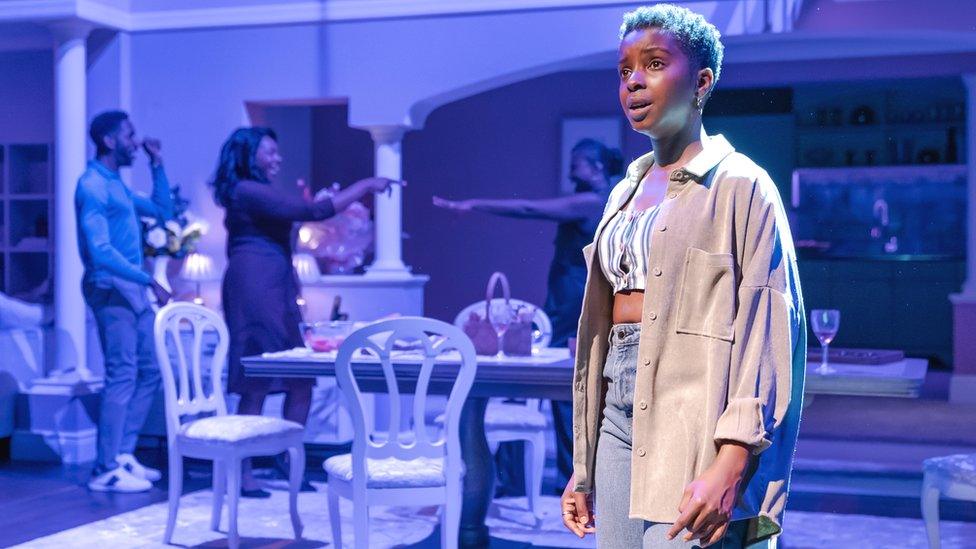
Donna Banya plays talented but troubled daughter Keisha
And there you have it, a sit-com type set-up with lots of banter and some amusing sight gags. Theatre doesn't get more comfortable or conservative than this, with Jasmine posing upstage in front of an imaginary mirror, and Beverly hiding Dayton's old beer bottle behind a sofa cushion. I mean, it couldn't be more tame.
But then, as Jim Thompson, a 20th Century American writer of crime fiction once said: "there is only really one plot: things are not what they seem."
And that is the case with Fairview. Act II and Act III take the homely Act I between their teeth like a starving Rottweiler dog, and break its neck in a thousand places.
The theatrical fourth wall that Jasmine made such a fuss about accentuating when looking into the mirror in Act I, is not so much broken as smashed to smithereens with a sledgehammer, leaving shards of its imaginary glass all over the auditorium.
You see, this is not a play about a birthday party, even a Pinteresque one with all its menacing overtones.
Fairview is about something else altogether.
It is not a traditional play operating within the confines of a stage framed by a proscenium arch. It is Shakespearian in scope. All the theatre's the stage, and all the men and women in it merely players.
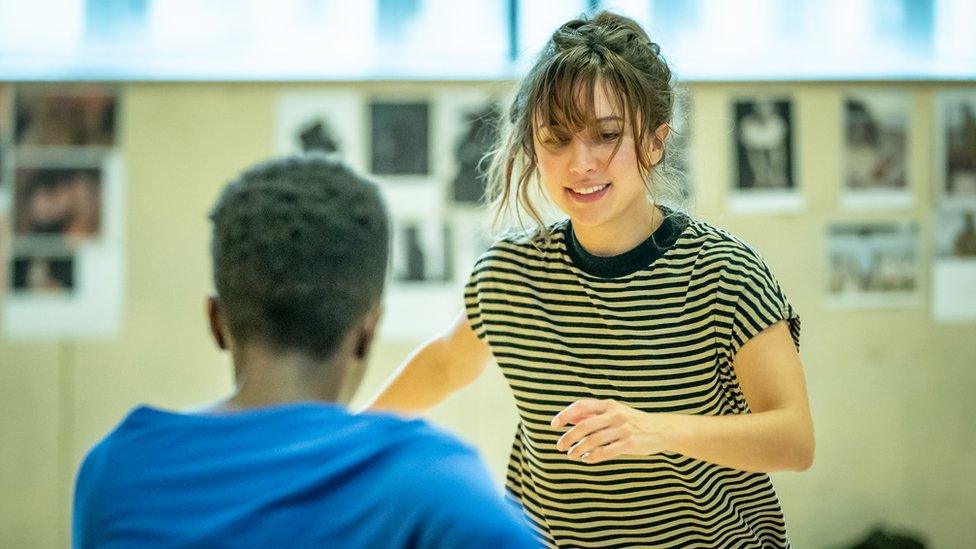
Suze (Esther Smith in the striped top during rehearsal) tells her "granddaughter" Keisha, "I was your age once"
I won't divulge more - you'll find out if you go. But what I can say without risking spoilers, is the play's true subject is how white people watch black people perform and the effect that has on both parties. It is, to use a fancy term, about the white gaze.
As an art fan, I was familiar with the "male gaze", which is a pejorative term to describe the privileged position male viewers have been given in art. Put simply, the game has been rigged for their benefit: images are produced for the male gaze, most obviously in the genre of the female nude.
Jackie Sibblies Drury, Fairview's 37-year old black playwright, describes the "white gaze" in theatre as the effect a predominately Caucasian audience has on black performers, making the actors feel an otherness, while at the same time being expected to conform to racial stereotypes.
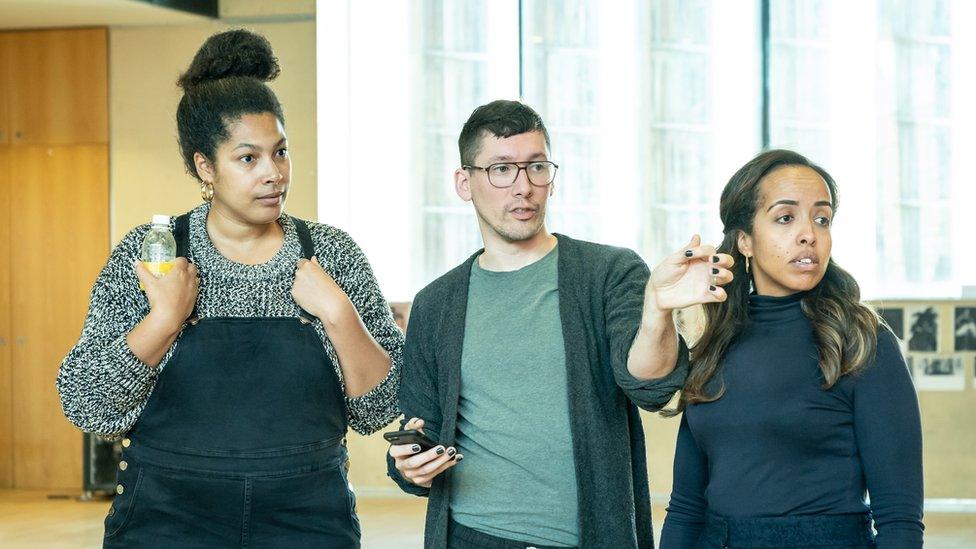
L-R: Jackie Sibblies Drury (playwright), who won the 2019 Pulitzer Prize for Fairview, seen watching a rehearsal with Tom Scutt (designer) and Nadia Latif (director)
As with the male gaze, the white gaze is about inequality and privilege: how those subjected to it are diminished while the empowered beneficiaries remain blindly, smugly, oblivious.
Far from being a conservative play, Fairview is a radical, conceptually bold piece of theatre that toys with form like a cat plays with a mouse. Tropes and clichés are mischievously subverted, as are the limits of what theatre should be. There's a surreal humour evident throughout, which starts as a knowing wink before becoming increasingly dark and aggressive.
It's a week since I saw it and I still don't know what to make of Fairview, an intentionally divisive play with contemporary concerns centred around surveillance and identity politics at its heart.
I can't say I enjoyed it, but I will never forget it. And I'm lucky I had the chance to see such a remarkable work of art, which made me think differently about theatre.
It is difficult to sum up with a star rating, but easy to do so in a word, which is "impactful."
Recent reviews by Will Gompertz
Follow Will Gompertz on Twitter, external
